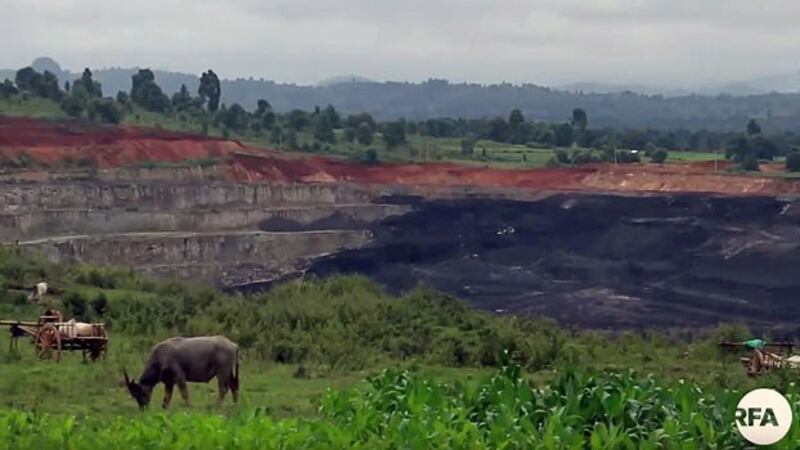Myanmar’s government on Tuesday rejected a Shan state member of parliament’s proposal to shutter a Chinese-owned coal-fired power plant residents of his region say has exceeded land use specifications, severely polluted the local environment, and jeopardized their health and livelihoods.
Shan Nationalities League for Democracy (SNLD) party lawmaker Sai Tun Aye proposed the motion not to extend the operation period of the Tigyit coal-fired power plant in Shan state’s Taunggyi district to a parliamentary session in the capital Naypyidaw, citing the concerns of his constituents, but was rebuffed by Deputy Minister of Electricity and Energy Khin Maung Win.
“My answer to the proposal from Sai Tun Aye is that, while the power generation is not very efficient for the region, we do benefit from this plant as it is capable of distributing some amount of electricity to the people,” Khin Maung Win said at the session.
The deputy minister noted that there “is no record from the [Pinlaung] township health department” which shows that the plant has had a negative impact on local health and the environment, and said the facility also benefits local farmers by distributing water.
Wuxi Huaguang Electric Power Engineering Co. Ltd., a Chinese energy company specializing in coal power, operates the plant in Tigyit village. It took over Myanmar’s largest coal mine—located about 1.5 miles away—in 2002 to feed the 120-megawatt plant, which became the country’s first coal-fired power project when it went online in 2005.
Khin Maung Win said Tuesday that when Wuxi Huaguang began upgrading the plant in 2016, the government gave the company permission to operate the facility on an annual basis until 2019, after which authorities granted it the right to do so for an additional three years “because it ran the plant according to the law.”
In the meantime, an evaluation committee consisting of local residents, the Shan state government, a group from the Pa-O Self-Administered Zone that oversees Pinlaung township, and the Ministry of Electricity and Energy have been regularly checking in on the plant to ensure it complies with operating standards, he said.
He added that the plant employs 318 workers—more than 200 of whom are residents of the region.

Plant tradeoffs
Responding to Khin Maung Win’s comments on Tuesday, Sai Tun Aye told RFA’s Myanmar Service that the deputy minister had failed to address the central premise of residents’ complaints he put forth in his proposal.
“The minister’s answer was that they burn coal and we get power, which is a benefit,” he said.
“What I meant was whether it is a good project when you compare the environmental damages to the benefits we get,” he added.
“Does the plant support society or simply the country’s economy? If we are only getting a little bit of energy in exchange for the health and environment of the local people, we should reconsider renewing permission for the plant.”
Sai Tun Aye noted that residents and local civil society organizations (CSOs) have held repeated protests over the plant’s impact and said that it should only be permitted to continue operating if it is upgraded to use international standards for disposing of coal byproducts.
According to the Myanmar Times, the Tigyit plant was closed in 2014 for ignoring a waste management request issued by the Ministry of Electricity and Energy, which had received complaints about the impact of waste from the facility on the surrounding environment.
The following year, Wuxi Huaguang was granted a 22-year license by the government to recommence operations after it pledged to upgrade the plant and conduct the necessary waste management procedures.
But despite the upgrade and Khin Maung Win’s insistence that the plant has since operated in line with the interests of the community, resident Sein Thaung told RFA that it is “really destroying the environment” through the pollution of air and water, as well as damage to local infrastructure.
“When they explode [gunpowder in the] coal mines, our houses vibrate and we are also subjected to landslides,” he said, adding that nearby villages are also dealing with a shortage of water because it has been diverted to the mine.
“It is true that our country gets a little bit of power from this plant, but thousands of people have become sick, our environment is destroyed, and we have lost our land.
Reported by Thiha Htun for RFA’s Myanmar Service. Translated by Khet Mar. Written in English by Joshua Lipes.
